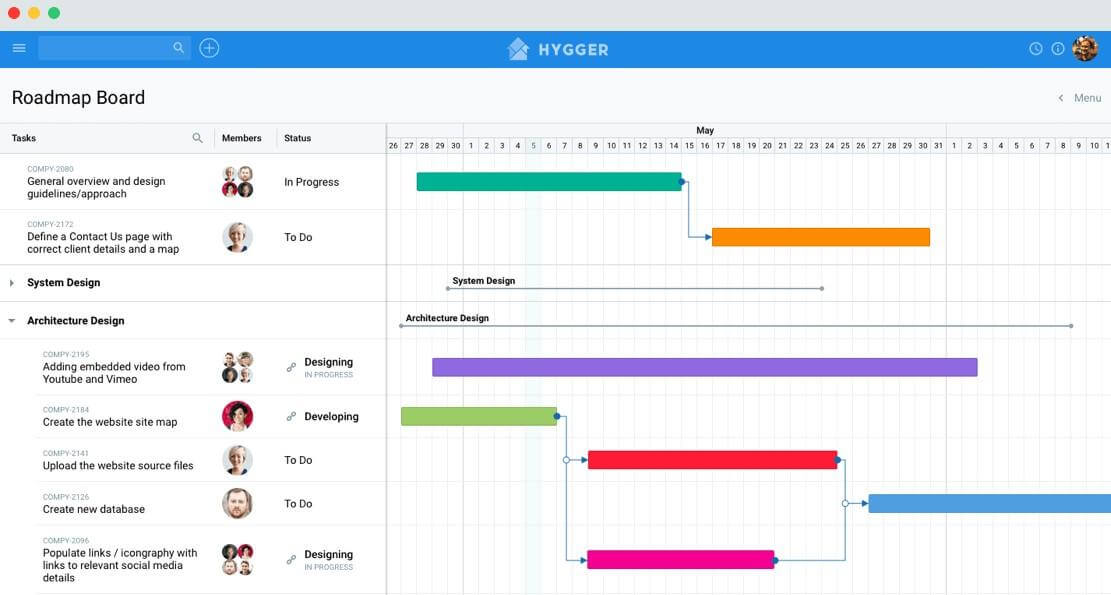How to Run an Effective Performance Review and Get Maximum Benefits

Most managers all over the world once a year arrange a special event with each of their team members. This event is called the annual performance review.
The review can make someone feel awkward and forced and sometimes does not help employees get better at their jobs. However, many companies believe that this kind of meeting brings real benefits. In this post, we try to figure it out. You will find effective tips for both employers and employees on how to make the review better and more effective ![]()
What is a Performance Review?
Looking for a performance review definition, you may also come across the references like peer review, performance appraisal or 360 review. All these names define the same meaning.
A performance review is not just a talk-to-talk meeting, it’s a tool that measures and assesses employee efficiency and effectiveness.
Performance is a rational basis to determine whether a salary increase is warranted, additional training is required, or promotion to a higher-level position is needed. The review can be conducted several times a year, optimally once a year.

The process of 360 review: how does this happen?
There is no established standard. Each company, as well as each manager, practices its own standards and can change them, depending on internal goals and needs.
First, an employee writes a self-assessment, which clarifies all the tasks performed, the goals achieved and wins reached.
He/she notes the difficulties and barriers that had to be encountered, as well as the tasks that were not completed and the reasons for their failure. This document is the basis for the review.
Here we highlight 6 general steps that make up a peer review:
1. Defining performance standards
Performance standards are necessary for each job position, as they are used to fulfill the company’s mission and vision. These standards are established based on job descriptions and employee handbooks and can be adjusted, based on changes in business needs.
2. Communication
After establishing performance standards managers should clearly communicate these standards to employees. Regular reviewing meetings reiterates to employees that everybody must meet certain requirements to be eligible for raises or retain employment.
3. Measuring employee performance
At this stage, managers track and review how employees are performing, often based on their self-assessment document. Goals might be reviewed monthly. Managers define how often various performance standards should be reviewed based on how it affects business results.
4. Comparing all employee metrics
Every company and its employees are unique. However, comparing employees with each other gives managers an idea about if it’s a bigger issue of training or operations obstacles.
For example, some companies practice the following system, based on 5 common performance categories that in result influence on the bonuses:
- Underperformers – the employees who objectively do not cope with their tasks or perform them for a very long time. They typically do not get bonuses.
- Developing players – they do their job, but not always on time and not always completely. In this case, they most often get 80% of the planned bonus.
- Playmakers – they perform tasks in accordance with expectations and logically get their 100% bonuses.
- Star players – these employees perform proactively and faster than expected. There may be additional bonuses and career advancement for them.
- Most valuable players who constantly perform better than others and do many tasks. They permanently get additional bonuses and their promotion on a career ladder is also privately discussed.
5. Employee feedback
It’s better when performance appraisals are reviewed with employees. Managers should provide feedback about what has been done well and what need improvements.
All feedback thoughts should be written in objective terms and communicated in a positive manner.
6. Developing the action plan
Setting an action plan is the final stage of the review. Managers build global goals around areas of employee success and provide specific steps for improvement if needed.
Today, it’s good practice to use convenient to-do lists or Kanban boards to plan and manage tasks, objectives and working ideas.
Using a modern management tool, you can also set priorities for all your items.

Of course, each company and industry may have its own conceptual options.
For example, here’s how ProSky, the company that provides predictive tools for hiring managers, evaluates the role of performance review in their corporate culture. We asked Crystal Huang, CEO of the company to comment on the subject:
“At ProSky, we believe that Performance Reviews should be a continuous process, not just a “one-and-done” annual report. The way we approach performance reviews is as an ongoing evaluation or conversation between manager and employees. As they interact with each other, managers and employees are able to give and receive relevant feedback that benefits both sides.
The advantage of this approach is that you are able to receive information in a timely manner and make necessary improvements right away. Instead of waiting for the annual or semi-annual review, managers can give feedback as soon as it is needed to your employees. Employees are also able to report on their progress and share their opinions on projects. Having a constant feedback loop allows the company to continually align employee and manager goals with the goals of the company to help everyone achieve success!”
Most typical performance review example questions
These questions may help you to be prepared for the 360-review meeting and think out the answers for the outstanding interview.
1. What was your most serious accomplishment at work?
This is a rather positive beginning that will give employees a chance to express how they define their value in the company and tell where they feel they’ve succeeded.
Usually, people have something to say and willingly share examples of true work accomplishment. However, there can be cases when they take credit for someone else’s accomplishment that is surely a bad idea.
2. What are you going to achieve over the coming year?
The answer will help you to define if your team members need training or coaching. It will also be helpful in planning specific goals and thinking about the future.
Asking this question, you definitely expect to get a detailed list of goals and demonstration of strategic thinking. The more these goals complement the company’s goals, the better.
3. Is there something to improve?
This question will define if the person clearly understands what his/her weaknesses are. The answer will give you useful insight into how to optimize the situation.
Any reply will provide you with guidance on how to make a person a better employee. If this person can not contemplate any weakness he/she might have, you’re probably dealing with a person, who is not an ideal team member.
4. What is your next planned position at the company?
Receiving such info, you’ll be able to evaluate how to help employees to achieve those goals. Several reviews will help them to chart the progress of their ambitious and interests.
It’d be great if they demonstrate a clear understanding of the company’s hierarchy and answer realistically.
5. What success drivers can you define in the company?
The question is aimed to recognize how well the person understands the company’s priorities. The main idea is to get the employee’s understanding of what counts as success within his/her own department. Thanks to their answer, you’ll have a better idea of how they suit the needs of the company.
6. What do you think about team collaboration?
The well-being of the team really matters. As the person you review is working as a part of a team, it’ll be useful to get insights on the dynamics impacting his/her productivity.
The more your employees share their own opinions about this subject, the better you will be able to resolve problems and manage them effectively.
7. Do you have everything you need to perform?
If you want to get constructive feedback about general working conditions and the environment inside the company, then this question will assist. Employees will tell you directly how they are limited or how their productivity can be improved.
8. Do you like the corporate culture or can you suggest some improvements?
The corporate culture of your company reflects the external environment. It may seem good for you but it worth to know how it feels for those around you.
9. What was the role of management in performing your work?
It is a kind of test, demonstrating how honest your employee is. Anyway, it can show you what is and isn’t working in your business. Ideally, you’ll get the insight in terms of the impact and results of your management.

 Performance review tips for managers
Performance review tips for managers
The effective review meeting should contain discussion of both positive performance and areas for improvement. This information should not be as a surprise or discovering for employees at their formal performance meeting. The feedback should be provided regularly.
There are some obvious things that may help you to run a good performance review. All depends on your company’s culture and the atmosphere in your team but following these tips will allow you to get better results:
- Care about purposes and structure. Each employee should have a clear understanding of why the review is happening, what are its goals and what will be covered there.
- Don’t wait to propose feedback. If there are some problems with performance, address them right away.
- Set clear expectations and explain the criteria that you will use for performance evaluation.
- Choose the right questions and try to uncover key motivators. Use open-ended ones, to make your team members feel free to share their insights.
- Listen actively. As a manager, you should provide feedback on their own performance or the company’s direction.
- Focused on the big picture. Do not forget to explain to employees the effect the performance had on company priorities.
- Find the balance between positive and critical. Avoid negativity, but remember that sometimes even the best workers need to receive critic.
- Set time for achievements. The peer review should recognize the good work of employees and be focused on things to improve. To set precise periods and dates for improvements, use a convenient online roadmap, such as Hygger offers:

 Performance review tips for employees
Performance review tips for employees
The most effective peer review is always about re-emphasis of critical points. Here’re some essential tips for employees to improve the performance review:
- Be adaptable and explain how you’ve shown initiative to build your job skills. It’s about attending professional courses, seminars, webinars, and being aware and proficient in the latest software.
- Listen attentively. The goal of feedback is to help bring out the best of your abilities. Actively listening considers how you can apply the words to your responsibilities.
- Be engaged. Any 360 performance review is a conversation between you and your manager, that is why you need talking points. Enhance your agenda with the common but very important issues:
- What additional knowledge or skills do you need to perform better?
- What could you be doing differently?
- How can you be more helpful?
- What goals does your employer have for you?
- What challenges does your manager predict over the next year?
- Be innovative. Recollect one of your brilliant ideas that were successfully implemented or the successful way that has helped you to solve a challenge.
- Be positive. Initiate an energetic talk about the company and the people you work with to contribute to positive talk stream.
- Dig deeper and be proactive. Do not doubt to ask questions about the reviewer’s feedback. You will be able to improve only if you completely understand what areas need improvement and why you are not meeting expectations.
- Forget about defensiveness. The way when you go on the defensive, trying to offer explanations or excuses, is not the right way. If you need to explain your mistake, make sure you have enough supporting evidence.
Summary
Performance reviews should effectively complement your business and become part of the entire company’s life.
Hopefully, the tips proposed will help you make peer reviews positive and motivational. If you run them in the right way – they will improve your ability to interact with your reporting employees.

 “At ProSky, we believe that
“At ProSky, we believe that 

